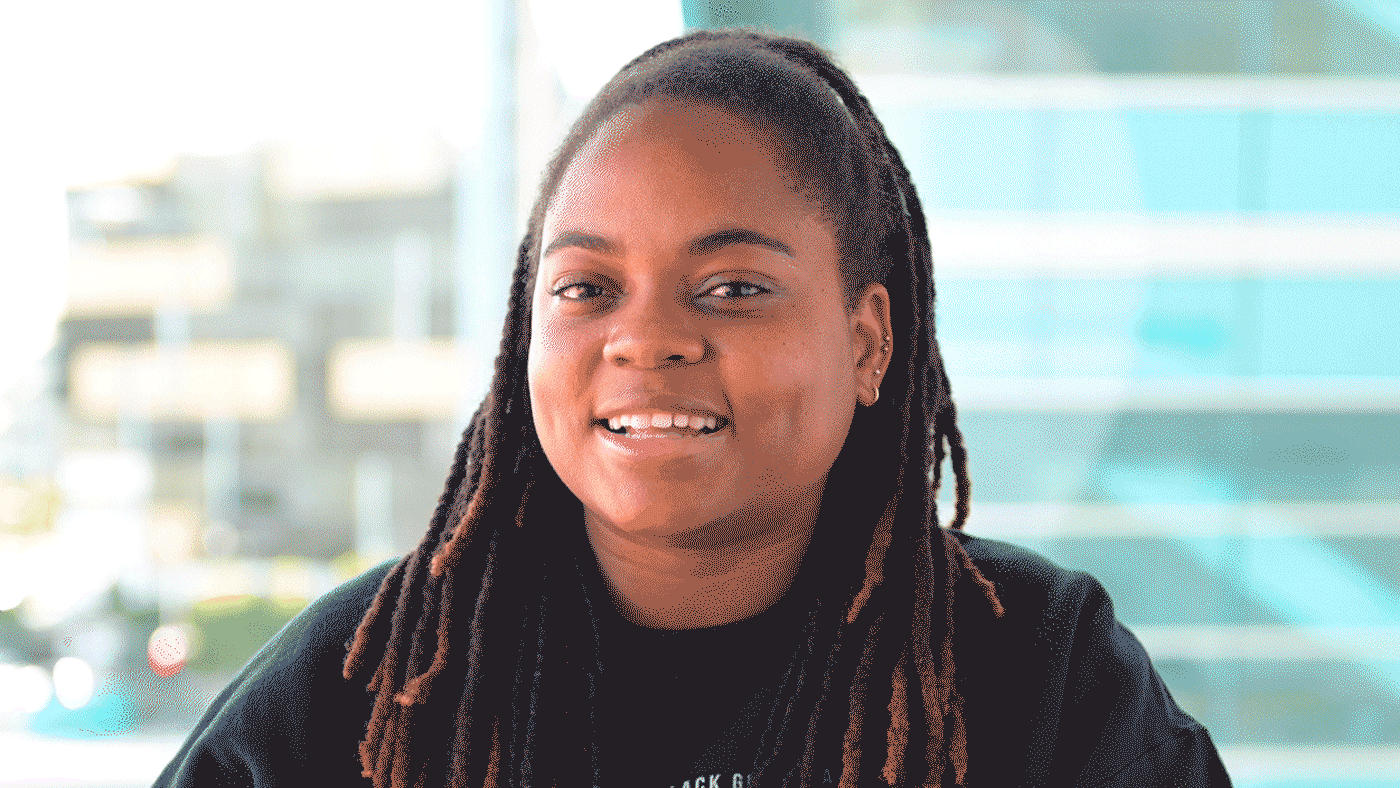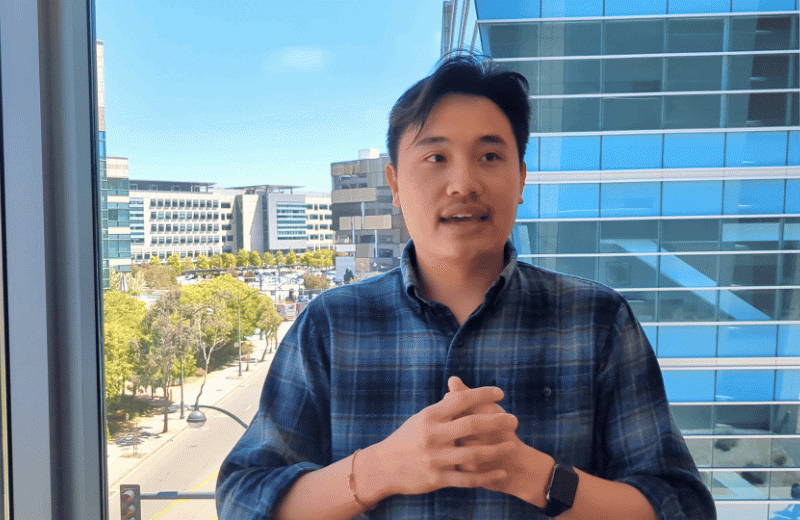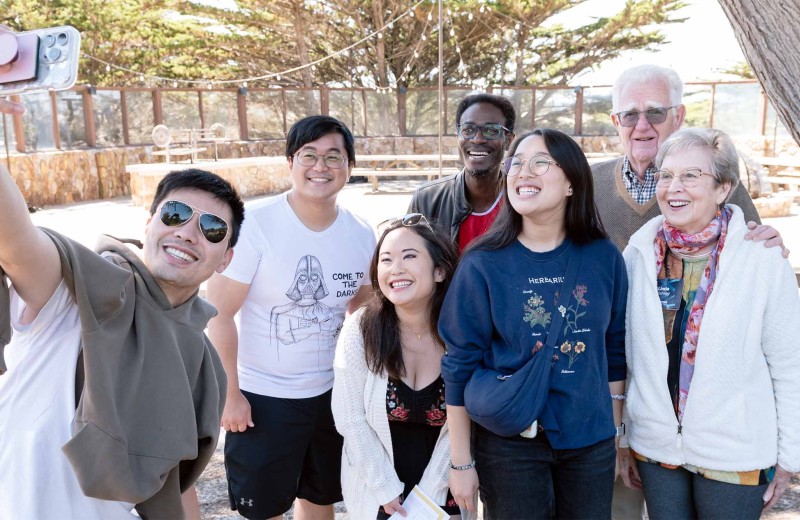Gladstone NOW: The Campaign Join Us on the Journey✕

Carribean-born scientist Alicer Andrew shares her work on HIV in the Roan lab, the hidden talent she discovered at Gladstone, and advice she has for other Black scientists.
Alicer Andrew (she/her), PhD, was born and raised on the Caribbean island of Antigua. She majored in biology and minored in French at the University of Georgia, then earned her PhD there, studying malaria infection during pregnancy. Currently, Andrew is a postdoctoral scholar studying HIV in the lab of Nadia Roan.
What brought you to Gladstone?
The exciting research happening in Nadia Roan’s lab, and specifically her work in understanding how aspects of the female reproductive tract enable HIV infection.
What do you like about Gladstone?
The friendly work environment, the excellent financial and mentorship support offered to postdocs, the access that we have to cutting-edge technologies, and the amazing science being done here. And of course, the free snacks!
Were you interested in science as a child?
Yes, very much so! Although, I thought I wanted to be a medical doctor, specifically an OB/GYN. But I’m really happy that I decided to pursue my PhD instead because now I get to do what I really enjoy, which is performing experiments and making new discoveries that will ultimately improve women’s health.
Why did you decide to go to graduate school?
As a third-year college student, I had my first opportunity to shadow in a research lab. At first, this was just a requirement I had to fulfill for medical school, but I quickly realized how much I enjoyed the process of designing and performing experiments to answer really interesting and unexplored questions in biomedical sciences. By the time I made it to graduation, I knew for sure that I wanted to do biomedical research.
So even though I took the MCAT and applied to medical school, I knew that I belonged in graduate school pursuing research training in infectious diseases, and more specifically malaria infection during pregnancy.
Can you describe your current research project?
Currently, I am investigating how antiretroviral therapy (ART), which is used to treat people living with HIV, affects immune responses to HIV infection. ART helps people with HIV to live long and healthy lives by stopping the virus from completely destroying their immune system. However, ART does not cure the infection, so it must be taken continuously for the rest of one's life to prevent the virus from coming back.
My research is trying to understand how a special class of immune cells called T cells are affected by ART and how T cell responses to HIV infection change over time on ART. From these findings, we’ll learn more about immune responses to HIV while on ART and use that knowledge to improve future strategies for HIV cure. Ultimately, I’m looking forward to applying all the skills and expertise I develop during this project to future studies that focus on improving women’s health in the context of infectious diseases, immunology, and reproductive biology.
What or who influenced your decision to work in science?
I’d say that my Caribbean background had a heavy influence on my decision to work in science because, growing up, my peers and I were always encouraged to pursue studies in some aspect of science. Science isn’t for everyone, though, so I’m lucky that I happened to enjoy it.
What do you do when you are not working?
I’m usually exploring a new restaurant or neighborhood in the city, catching a movie, or spending time with my partner or friends.
If you could learn to do anything, what would it be?
Hands down it would be to learn another language. I learned to speak a bit of French while in college and was fortunate enough to live in Paris for a year to perfect my skills. I’d be happy to accept the challenge and excitement of learning a different language and then having another opportunity to live and practice with native speakers.
What is your hidden talent?
I learned this about myself recently: apparently I’m really good at improv and I really enjoy it. It’s an opportunity to have fun and be creative in a way that is so different from how I usually spend my time. UC San Francisco has a great improv group that is led by a Gladstone investigator named Michael Alexanian. Everyone should check it out!
February is Black History Month. What advice do you have for other Black scientists or those working in STEM?
You’re amazing! And you are, in some way, Black history in the making! So keep pursuing your goals, have fun, and don’t forget to get some rest and relaxation along the way.
Want to Join the Team?
Our people are our most important asset. We offer a wide array of career opportunities both in our administrative offices and in our labs.
Explore CareersMeet Gladstone: Oscar Yip
Meet Gladstone: Oscar Yip
Oscar Yip is advancing Alzheimer’s research in Yadong Huang’s lab at Gladstone while drawing inspiration from his family, community, and his broader goal of helping patients.
Graduate Students and Postdocs Profile Alzheimer’s DiseaseFrom Mentorship to Legacy: Creating Opportunity for Early Career Scientists
From Mentorship to Legacy: Creating Opportunity for Early Career Scientists
Robert and Linda Mahley’s commitment to trainee development continues through Gladstone’s annual Career Advancement Awards.
Graduate Students and Postdocs HistoryWhen Brain Cells Talk: NOMIS-Gladstone Fellow Yuliya Voskobiynyk on Decoding Microglia’s Secret Signals
When Brain Cells Talk: NOMIS-Gladstone Fellow Yuliya Voskobiynyk on Decoding Microglia’s Secret Signals
NOMIS–Gladstone Fellow Yuliya Voskobiynyk, PhD, shares her journey from Ukraine to Gladstone and how her research on microglia could shed light on brain function and diseases like epilepsy and Alzheimer’s.
Graduate Students and Postdocs Profile Neurological Disease NOMIS



